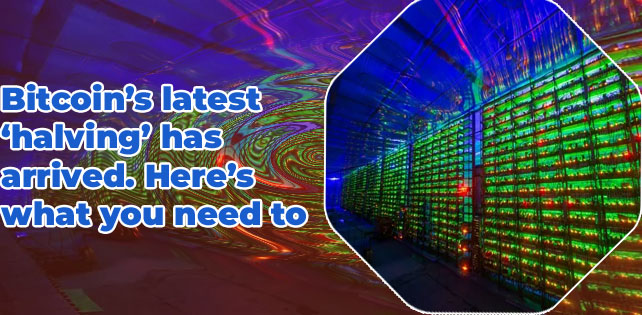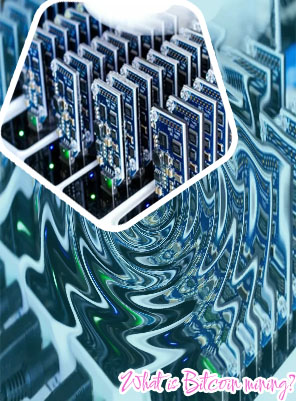Bitcoin mining meaning

Bitcoin mining can be a complex concept for many to understand, as it involves the process of adding transaction records to Bitcoin's public ledger of past transactions or blockchain. To help clarify the meaning of Bitcoin mining, it is essential to explore in-depth articles that explain this process thoroughly. Below are three articles that will aid in solving the topic of "Bitcoin mining meaning":
Unraveling the Mystery of Bitcoin Mining

Bitcoin mining is a fascinating process that plays a crucial role in the functioning of the popular cryptocurrency. Essentially, mining involves using computer power to solve complex mathematical puzzles, which in turn verifies transactions on the Bitcoin network. By doing so, miners are rewarded with newly minted Bitcoins and transaction fees.
Here are some key points to help demystify the process of Bitcoin mining:
-
Mining Hardware: To participate in Bitcoin mining, miners need specialized hardware known as ASICs (Application-Specific Integrated Circuits) or GPUs (Graphics Processing Units). These powerful devices are designed to perform the necessary calculations quickly and efficiently.
-
Mining Pools: Given the intense competition in the mining industry, many miners choose to join mining pools. These pools allow miners to combine their computational power and increase their chances of successfully mining a block. Rewards are then distributed among participants based on their contributions.
-
Difficulty Adjustment: The Bitcoin network automatically adjusts the difficulty of mining puzzles to ensure that new blocks are added to the blockchain roughly every 10 minutes. This adjustment occurs approximately every two weeks and is essential for maintaining the integrity and security of the network.
-
Energy Consumption: Bitcoin mining is a resource-intensive process that consumes a significant amount of electricity. As a result, environmental concerns have been raised regarding
The Ultimate Guide to Understanding Bitcoin Mining
Today, I had the pleasure of diving deep into the intricacies of Bitcoin mining, a topic that has piqued the interest of many individuals worldwide. As I delved into the comprehensive guide, I was impressed by the level of detail and clarity with which the process was explained.
The guide adeptly breaks down the concept of Bitcoin mining, from its fundamental principles to the complex algorithms that drive the process. By shedding light on the technical aspects of mining, it equips readers with the knowledge needed to understand how new Bitcoins are created and added to the blockchain.
One aspect that stood out to me was the emphasis on the importance of specialized hardware in the mining process. The guide highlighted how the use of powerful computers, known as mining rigs, plays a crucial role in solving complex mathematical problems and securing the network.
Overall, this guide serves as an invaluable resource for anyone looking to gain a thorough understanding of Bitcoin mining. Its comprehensive coverage of the topic and clear explanations make it essential reading for beginners and experts alike. By equipping readers with the knowledge needed to navigate the world of Bitcoin mining, this guide empowers individuals to participate in this revolutionary technology.
Demystifying the Process of Bitcoin Mining
Bitcoin mining, a term that has gained popularity in recent years, refers to the process of validating and adding transactions to the blockchain. This process is essential for maintaining the security and integrity of the Bitcoin network. In order to mine Bitcoin, miners use powerful computers to solve complex mathematical equations. Once a miner successfully solves a block, they are rewarded with newly minted Bitcoins. This process, known as proof of work, ensures that transactions are verified and added to the blockchain in a decentralized manner.
One of the key benefits of Bitcoin mining is that it allows for the creation of new Bitcoins in a predictable and decentralized manner. This helps to regulate the supply of Bitcoins in circulation and ensures that the network remains secure. However, Bitcoin mining can be a resource-intensive process, requiring a significant amount of electricity and computing power. As a result, miners must carefully consider their operational costs and energy consumption in order to remain profitable.
Feedback from a resident of Tokyo, Japan, named Yuki Tanaka, sheds light on the topic. Yuki believes that Bitcoin mining is an intriguing process that can be both lucrative and environmentally impactful. He notes that with the rising popularity of Bitcoin mining, there is a growing concern about the environmental impact of mining operations. Yuki suggests that miners should explore more sustainable energy
Menu
- Crypto exchange
- Dogebtc
- Etherium vs etherium classic
- Cryptocurrency bitcoin price
- How to transfer money from cryptocom to bank account
- Where to buy crypto
- Most viewed crypto
- What the hell is bitcoin
- What is a bitcoin halving
- How to add bank account to cryptocom
- How to withdraw money from cryptocom
- How do you buy cryptocurrency
- Weth crypto
- Highest bitcoin price ever
- Apps cryptocurrency
- Bitcoin cryptocurrency
- Crypto com nft
- Should i buy bitcoin before halving
- Create cryptocurrency
- Bit coin diamond
- When to buy bitcoin
- Best crypto news websites
- Who has the most btc
- Dogecoin to a dollar
- Cryptocurrency exchanges
- Can i buy dogecoin on cash app
- Free crypto coinbase
- Cryptocom xrp
- Litecoin price today
- How does bit coin work
- Where to buy ethereum
- Buy crypto with credit card
- Where to buy shiba inu crypto
- What is usdm on cryptocom
- Where to buy catgirl crypto
- Crypto com not letting me buy
- Baby dogecoin price chart
- Safemoon crypto com
- When will all btc be mined
- Which crypto to buy right now
- Today's bitcoin cash price
- The crypto
- Top cryptos
- How much bitcoin should i buy to start
- Cryptocoin com coin
- Cryptocurrency prices
- Bonfire crypto price
- How much is pi crypto worth
- Coindesk bitcoin price
- What is btc wallet
- Buy bitcoin cash
- What app can i buy dogecoin
- Buy dogecoin stock coinbase
- How to buy dogecoin on iphone
- Crypto com not working
- Cryptocurrency to buy
- Ethusd price
- To invest all profits in crypto
- Mana crypto price
- Cryptocom card
- Ethereum crypto
- Ethereum bitcoin wallets
- Bit price
- Crypto wallet app


